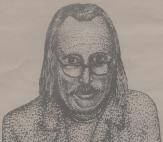
|
Eric Irwinby Liz and Brian1.1.2014 |
We think Eric must have been in his late 40s when we knew him in 1972. He always wore a long jacket and smoked roll-ups - saving the end of the tobacco in his tin for next time. He was quite unsteady and found stairs difficult. This was because he had ataxia as a result of the medication and ECT he had in hospital. He was in a long stay hospital for a very long time and described being in solitary confinement. He told us he was labelled under various diagnoses - psychopath, manic-depressive and schizophrenic. He very strongly challenged all these labels and concepts of 'treatment'.
His most important possession was his lighter. If this vanished from his sight he would become anxious. This anxiety went back to his days in the hospital where this was one of his only possessions. He described to us how staff came and 'measured' him for a double leucotomy. He told us he had made use of the Mental Health Act 1959 to protect his rights and did not have the procedure. This was a major victory for him.
He lived in a Richmond Fellowship house and once we went to visit him there - it was in West London. He was exceptionally well read and recommended important books to us such as 'Blaming the Victim' by William Ryan. The 'fish' quotation was Eric's idea as he had read Carl Menninger. He also valued Bertrand Russell's writings and was very knowledgeable in philosophy - one of his main interests. Eric would come round to our flat in Crouch End and we would talk for hours. He taught us so much and we still think of him as one of our most valued teachers.
The fish pamphlet was written by Eric and Brian mainly - though Lesley and Liz were also involved. Although there was much debate about it, this was all positive and represented a coming together of ideas. Clive from Oxford who had written 'Everyday Death in the Madhouse' was also a strong influence.
Eric did not speak of his past or his family and we have been recently wondering why he was in hospital in the first place. He came across as though he had had a good education though he also said he survived hospital by reading constantly. Eric was a very kind man. He came with us to Paris to the conference of mental patient's unions across Europe.

|
Eric Irwinby Barbara Norden29.1.2014 |
I first encountered Eric at a meeting of the Mental Patients' Union in 1974. What stood out about him, at first sight, were the violent twitches of his neck and jaw. I assumed he had cerebral palsy, but it was explained to me that this was something different: an "extra pyramidal symptom" caused by high doses of the anti-psychotic medication still in use at that time.
The next thing I became aware of was Eric's incisive intelligence, apparently undimmed by institutions and psycho-actives. He always had perceptive comments to make about the business in hand at MPU meetings, wile tossing his head and working his jaw - which must have been painful to him, but which he managed with dignity.
Finally, there was his remarkable energy and his commitment to MPU, and to other campaigns giving a voice to psychiatric patients - or "service users", as we are now officially named.
I never got to know Eric well. Following my own further "episodes" in the 1970s, and the demies of COPE (which I had helped to set up), I lost touch with survivor activism for many years. But Eric remains with me as an example of someone who survived considerably more difficult conditions than those we subsequently had to endure, and who did not allow that to stop him from contributing all he could to the survivor cause.